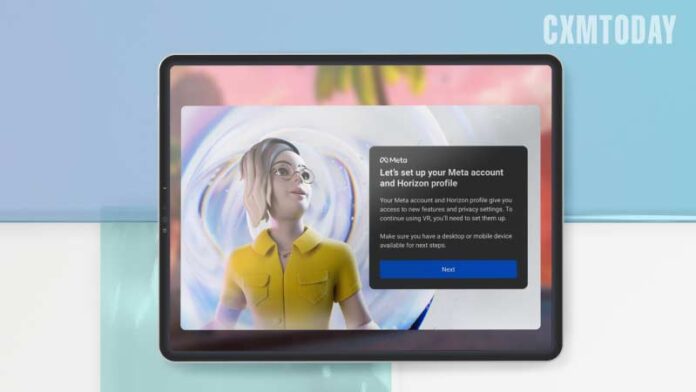Meta has announced that, as of next month, Meta VR users will no longer need to have a Facebook account to create a VR profile, which, up till now, has been a requirement of VR connection.
The move will separate Meta’s metaverse push from its traditional social media business, which could help Meta add a degree of distance from its Facebook brand – while users will still be able to link up their social media and VR profiles if they wish.
As explained by Meta, “Starting in August 2022, if you’re new to Meta VR devices or have previously merged your Oculus account with your Facebook account, you’ll need to create a Meta account and Meta Horizon profile. Suppose you’ve been logging into your VR device with your Oculus account. In that case, you can continue until January 1, 2023, when you’ll need to create a Meta account and Meta Horizon profile to continue using your Meta VR device.”
In Meta’s words, the process evolves your Oculus profile into a new customizable Meta Horizon profile, which will then become how you represent your social presence in VR. That, again, will help to provide a clear delineation between your Facebook past and VR future, which could be a good way for Meta to start its metaverse push with a clean – or at least, clean-er – slate.
Because the Facebook brand has been tarnished over the years by various incidences of data misuse and other controversies, Facebook is also now an older, more stable market presence. Anchoring future VR experiences to the Facebook app could leave Meta also anchored to its past perceptions, making this a particularly effective and important update.
Indeed, Meta is keen to note that your Meta account is not a social media profile:
“[Your Meta account] lets you log into your VR devices and view and manage your purchased apps in one place. In the future, we’ll extend Meta account functionality so you can use it to log into other Meta devices.”
So it’s a fresh start, a new, modern profile format, which will be connected to your digital avatars and other future-looking experiences and tools without your Facebook history tied to your presence.
Though as noted, you’ll still be able to link your Facebook account if you want to, which will help you find friends in the VR space. You’ll also now be able to connect just your Instagram account, a much-requested addition, which again provides more capacity for formulating a whole new digital presence without Facebook being the key proxy.
Which also, in some ways, seems to devalue the Facebook brand, or at the least, acknowledge that Facebook’s time may be limited.
The stats speak for themselves – according to Meta’s internal data, younger users are simply not relying on Facebook as they have in the past, which points to a broader shift away from The Social Network in favor of newer, fresher platforms.
Now, Meta can also be one of them – but again, it does feel like this is a bit of a white flag from Zuck and Co, a recognition that a lot of people simply don’t like Facebook, which may, eventually, become an existential concern for the app.
But it makes sense. The idea that you can begin your metaverse experience without connecting your Facebook history feels refreshing, like a whole new experience that you can curate in a more deliberate, knowledgeable manner.
Most people created their Facebook profiles in their teen years, and there are likely various linkages and connections on there that you’re no longer interested in.
The metaverse, and your digital presence, are a whole new realm. And not, it can be exactly that, as Facebook has become a thing of the past.
Which is what seems likely to happen. Meta’s name change is about more than just distancing itself from bad associations, it’s a future-focused move that will eventually enable it to move on from the stigmas of Facebook’s past.
Of course, to truly achieve this, it also needs to ensure that it applies the lessons learned in building Facebook as it creates the metaverse, which includes safety tools, ad targeting missteps, censorship, etc.
Thus far, the indications are the Meta will have some big challenges on its hands on the safety front. But maybe, if it can get it right, it will be able to shed the baggage of Facebook as it re-emerges in the metaverse world.




